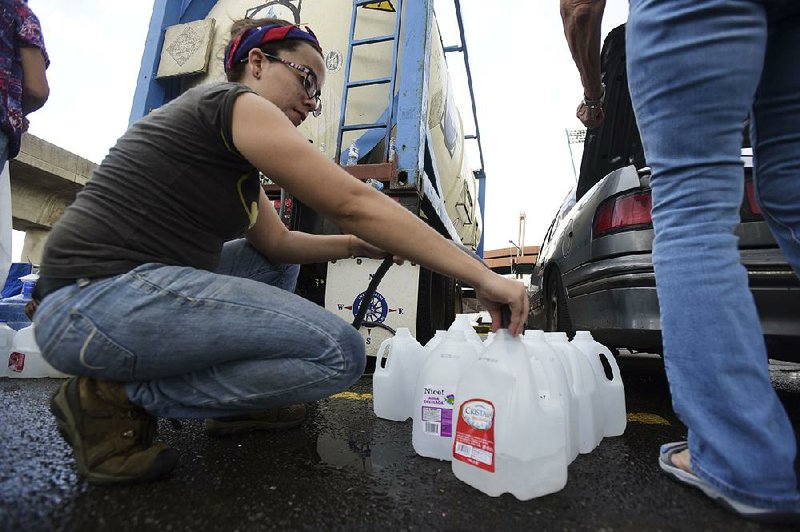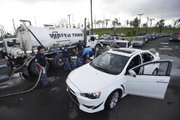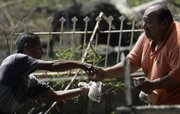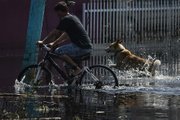WASHINGTON -- The Trump administration faced increasing pressure Thursday to mount a more aggressive response to the devastation in Puerto Rico, where residents said help was still scarce and disorganized eight days after Hurricane Maria slammed the island.
People staying in shelters were running out of supplies, and others described an absence of basic essentials, such as drinking water, food and electricity.
"With all the needs there are, we go out every day to the streets and are face to face with the people -- you don't see a single government agency," said Elizabeth Perez, a police officer in the city of Ponce. She recently visited poor neighborhoods in her district and found people living in dire conditions.
President Donald Trump on Thursday waived shipping restrictions that have complicated and limited humanitarian relief reaching Puerto Rico.
[PRESIDENT TRUMP: Timeline, appointments, executive orders + guide to actions in first 200 days]
Click here for larger versions
Photos by The Associated Press
Photos by The Associated Press
The waiver comes after criticism that the White House has been too slow to help the devastated island, which is a U.S. territory. White House press secretary Sarah Huckabee Sanders announced the waiver in a Twitter message.
Late Thursday, Trump tweeted: "FEMA & First Responders are doing a GREAT job in Puerto Rico." He also took issue with media coverage of the administration's response, writing, "Wish press would treat fairly!"
Puerto Rico's Gov. Ricardo Rossello had said Wednesday that he expected the shipping waiver, which suspends a 1920 law that allows the use of only U.S.-flagged ships for shipments between two U.S. ports. The law, known as the Jones Act, limits the number of ships that can go to Puerto Rico, and thus the amount of relief supplies that have arrived there since the hurricane.
The Department of Homeland Security had said as recently as Monday that the Jones Act would not be suspended in Puerto Rico. The department said then that there were sufficient ships available to meet the need.
On Wednesday, Trump suggested that he would not waive the restriction. "We're thinking about that," he told reporters at the White House. "But we have a lot of shippers and ... a lot of people who work in the shipping industry that don't want the Jones Act lifted. And we have a lot of ships out there right now."
Critics said Trump, who temporarily waived the act in Texas and Florida after storms hit there, cared more about a few U.S. shippers than he did about the 3.4 million people living in Puerto Rico.
The White House continued Thursday to insist that the Trump administration was doing all it could to help. About 7,200 troops were on the island, along with another 2,800 federal government relief workers, the White House said.
The Defense Department announced the appointment of a new commander, Lt. Gen. Jeff Buchanan, to work with federal aid agencies and lead military hurricane relief in Puerto Rico. He arrived on the island late Thursday.
Also, House Speaker Paul Ryan said the Federal Emergency Management Agency's disaster relief account would get a $6.7 billion boost by the end of this week. And acting Homeland Security Secretary Elaine Duke declared that "the relief effort is under control" in Puerto Rico.
Sanders told Puerto Ricans "we will not let you down."
Still, the call for a stronger response grew more urgent.
"There is a crisis in Puerto Rico," Sen. Bill Nelson, D-Fla., posted on Twitter. "Fuel, water & medicine sitting at the docks. Need immediate response by US military."
"Where is the cavalry?" he asked.
FEMA, which is leading the relief effort, has sent 150 containers filled with relief supplies to the port of San Juan since the hurricane struck Sept. 20, said Omar Negron, director of the Puerto Rico Ports Authority. He said all the containers were dispatched to people in need, but private aid supplies have not reached Puerto Rico.
FEMA officials also said Thursday that a million meals and 2 million liters of fresh water had been distributed in Puerto Rico and 2 million more meals and 2 million more liters of water were on the way. A day earlier, FEMA said it had distributed 167,000 meals and 539,000 bottles of water. The reason for the discrepancy was unclear.
The Department of Homeland Security's acting administrator of the region that includes Puerto Rico said distribution had been hampered by the destruction of the island's roads and bridges, which makes it hard to get supplies to those in need.
"In addition to building that first line of the supply chain, we are also rebuilding the entire distribution system ... how we're going to deliver commodities and resources to the people of Puerto Rico," John Rabin told reporters in San Juan. "We have often had to re-create the system in order to deliver food, water and commodities throughout the island."
Lawmaker Jose Enrique Melendez, a member of Rossello's New Progressive Party, said the Trump administration had focused more on making a good impression on members of the media gathered at San Juan's convention center than getting aid to rural parts of Puerto Rico. He called the federal relief response "a disaster."
"There are people literally just modeling their uniforms. People are suffering outside," he said.
Outside Puerto Rico's capital, residents sounded desperate Thursday.
"I have not received any help, and we ran out of food yesterday," said Mari Olivo, a 27-year-old homemaker whose husband was pushing a shopping cart with empty plastic gallon jugs while their two children, ages 9 and 7, each toted a large bucket. They stood in line in a parking lot in the town of Bayamon on the hard-hit northern coast, where local police used hoses from a city water truck to fill people's containers.
"I have not seen any federal help around here," said Javier San Miguel, a 51-year-old accountant.
In the town of San Lorenzo, about 40 miles west of the capital, people walked in calf-high water to get supplies because the bridge over the Manati River outside town was washed away in the storm.
San Lorenzo residents were collecting spring water to drink and taking turns cooking food for one another because they were running low on basic supplies.
"Just like God helps us, we help each other," said resident Noemi Santiago, weeping. "Here one person makes food one day, another makes it the other day, so that the food that we have goes further."
Military officials involved in past disaster responses said help for Puerto Rico should have been ramped up much earlier.
Russel Honore, the retired Army lieutenant general who was appointed by President George W. Bush in 2005 to take over the botched federal response to Hurricane Katrina, said in a series of media interviews Thursday that the government needs to quickly move 50,000 troops to Puerto Rico.
Hurricane Maria, which hit North Carolina's Outer Banks this week, producing high water and waves, washed over the only highway connecting Hatteras Island to the mainland. The storm was tracking away from the U.S. East Coast by Thursday.
Maria had moved slowly Monday and Tuesday, then accelerated out to sea late Wednesday and weakened to a tropical storm early Thursday. Its tropical storm force winds extended for as much as 240 miles from its center, churning up the surf on both sides of Hatteras and Ocracoke islands.
No storm-related injuries have been reported on the U.S. mainland.
Meanwhile, in Puerto Rico, residents said Thursday that they had yet to see their local officials distribute aid. In Ponce, people waited overnight this week to buy a rationed two bags of ice apiece, then had to repeat the act nightly because, without electricity, the previous day's purchase had melted.
Hector Marquez, 66, said he goes to the ice line each morning at 3 to be ready for the store's 7 a.m. opening.
"Have you seen a single tarp over anyone's house? People lost their roofs. Where are the tarps?" Marquez asked. "Nothing, nothing. They haven't brought anything here."
He rattled off a list of what he could not find: bottles of water, gas canisters to light stoves, food.
"Whatever little bit you had is running out," he said. "The trucks with food do not come. No trucks come with anything. You go to the supermarket, and it's almost empty."
Information for this article was contributed by Helene Cooper, Ron Nixon and Frances Robles of The New York Times; by Anne Gearan and Steven Mufson of The Washington Post; and by Danica Coto, Laurie Kellman, Michael Weissenstein and Ben Finley of The Associated Press.
A Section on 09/29/2017



